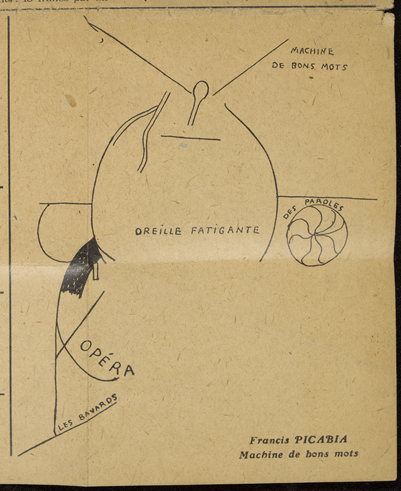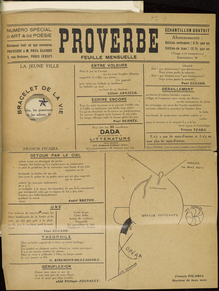In the March/April 1920 issue of Proverbe. Feuille mensuelle pour la justification des mots (Proverb. A Monthly Pamphlet for the Justification of Words), editor Paul Eluard (1895-1952) selected two works by Francis Picabia (1879-1953) for the front page. “La jeune fille” (The Young Girl) features a hole or vagina in the paper surrounded by the words “Bracelet de la vie” (Bracelet of Life) at the top left and “Machine de bons mots” (Machine of Witticisms) frames the words “Oreille fatigante” (Tiring the ear) on the bottom right.
For his own contribution, Eluard wrote:
Hoo! Que disions-nous? Que disions-nous?
Nous avons perdu la mémoire
Hoo! Que faisions-nous? Que faisions-nous?
Nous avons perdu la mémoire
Hoo! What were we saying? What were we saying?
We’ve lost the memory
Hoo! What were we doing? What were we doing?
We’ve lost the memory
Also in March of 1920, the front page of Picabia’s magazine 391 featured his manifesto on Dada, proclaiming (here translated):
Art is a pharmaceutical product for idiots.
Tables turn, thanks to the spirits; pictures and other works of art are like strong- box-tables, the spirit is within them and gets more and more inspired as the prices rise in the salerooms.
Comedy, comedy, comedy, comedy, comedy, dear friends.
…Dada, on the other hand, wants nothing, absolutely nothing, and what it does is to make the public say “We understand nothing, nothing, nothing.”
“The Dadaists are nothing, nothing, nothing and they will surely succeed in nothing, nothing, nothing.”
Both Picabia and Eluard show the influence by their colleague Guillaume Apollinaire (1880-1918), particularly the lines from his poem “Victoire”:
Ô bouches l’homme est a la recherche d’un nouveau langage
Auquel le grammairien d’aucune langue n’aura rien à dire
O mouths, humanity seeks a new language
Beyond the reach of grammarians
Our complete run of Eluard’s Proverbe has been digitized and will soon be available through Princeton Blue Mountain project.
http://library.princeton.edu/projects/bluemountain/journals


algarabia, charabia et Picabia. Le premier désigne la langue arabe qui est à la source du langage mathematique l'algebre, le second a été inventé par les latins qui ne comprenaient pas les subtilités de l'algebre mais plutôt celle des chars et le dernier a traduit les mots en images à NY comme si le mot Picture était enfoui dans son inconscient et qu'il n'avait pas remarqué que le préfixe de son nom pouvait l'influencer. A moins que cela fasse parti de son secret.